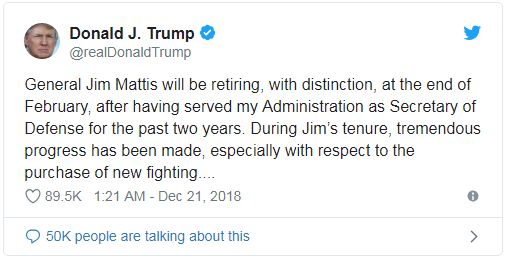Whitney WEBB
On Thursday, President Donald Trump announced via Twitter that Secretary of Defense James “Mad Dog” Mattis would be “retiring” in February and that a replacement for Mattis would soon be named. Mattis’ departure had been the subject of speculation since late June, when it was reported that Mattis was already being kept out of the loop on major administration decisions such as the unilateral withdrawal from the Iran nuclear deal, which Mattis had supported keeping intact. Rumors of Mattis’ exit as the Pentagon’s top official were then revived in September when it was reported that Trump was “actively discussing” his replacement.
Many top U.S. politicians — both Democrat and Republican — have mourned Mattis’ resignation. Sen. Mark Warner (D-VA) called news of Mattis’ departure “scary” and added that he “has been an island of stability amidst the chaos of the Trump administration.” Sen. Mitch McConnell (R-KY) also somberly greeted the news, stating that he “was sorry to learn that Secretary Mattis […] will soon depart the administration,” and adding that he was “particularly distressed that he is resigning due to sharp differences with the president on these and other key aspects of America’s global leadership.”
Similarly, major U.S. media outlets have long praised Mattis for being the “last adult in the room” in the White House and for allegedly helping to “constrain an unpredictable president.” With Mattis gone, top news outlets have warned that Trump is now “unbound.”
During his tenure, Mattis has been a proponent of many policies that hardly warrant his current treatment by the media and the political establishment as a heroic figure. Though Mattis opposed some of Trump’s policy decisions — most notably the recognition of Jerusalem as the capital of Israel and the administration’s withdrawal from the Iran deal — Mattis supported the genocidal Saudi-led and U.S.-backed war in Yemen up until late last month, threatened North Korea with “the destruction of its people,” and oversaw the U.S. bombings of Iraq’s Mosul and Syria’s Raqqa. The operation in Mosul alone was believed to have killed at least 6,000 civilians.
While Mattis was by no means a “hero,” it is almost a given that his replacement will be far more pro-war and pro-intervention than the outgoing secretary of defense, who was nicknamed “Mad Dog” for leading the U.S. attack on Iraq’s Fallujah in 2004. Indeed, back in September and now following news of Mattis’ resignation, the top contenders for the top position at the Pentagon and now being named including Senator Lindsey Graham and David Petraeus. However, a source close to the President cited by FOX News — Trump’s news outlet of choice — insists that the most likely candidates for Mattis’ post are Senator Tom Cotton (R-AR), and retired General John “Jack” Keane.
The lesser of two very evil evils?

Sen. Tom Cotton, R-Ark., interrupts a fellow senator during CIA nominee Gina Haspel’s confirmation hearing, May 9, 2018. Alex Brandon | AP
Tom Cotton, in his relatively short time as a senator, has gained a reputation for being extraordinarily hawkish, particularly regarding Iran. A long-time critic of the Iran nuclear deal, Cotton was one of the authors of a controversial letter to Iran during negotiations that was described by the Baltimore Sun as telling Tehran “to prepare for war” because the agreement could be nullified by the subsequent president. Since then, Cotton has repeatedly called for the unilateral bombing of Iran, which he insisted would only take “several days” and would not lead to a wider war.
Cotton is also markedly pro-Israel and received over $700,000 from the Emergency Committee for Israel in 2014 and nearly $1 million from that same group a year later. That same year, during the Israeli invasion of Gaza, Cotton called the Israeli military “the most moral, humanitarian fighting force in the world” despite the numerous war crimes it was committing at the time. A year later, Cotton called on Congress to supply Israel with B-52s and “bunker-buster” bombs to use against Iran.
Regarding the Syrian conflict, Cotton has been a vocal proponent of escalation for years and praised Trump’s decision in April 2017 to bomb Syria as restoring “our credibility in the world.” After Trump again bombed Syria this past April, Cotton released an official statement praising the attack, which read as follows:
The Butcher of Damascus [ostensibly referring to Syrian President Bashar al-Assad] learned two lessons tonight the hard way: weapons of mass destruction won’t create a military advantage once the United States is done with you and Russia cannot protect its clients from the United States. President Trump ought to sustain the attacks if Assad doesn’t learn these lessons, and Iran’s ayatollahs and Kim Jong Un might want to learn the easy way. We thank our old British and French friends for once again joining us in defending the civilized world.”
Furthermore, Cotton is also hawkish on Russia. Though a vocal critic of “Russiagate,” Cotton has called Russian President Vladimir Putin “a committed adversary of the United States.” He has accused Russia of having:
Meddled in our presidential campaign, violated arms-control treaties with the United States, invaded Ukraine, assassinated political opponents in the United Kingdom, made common cause with Iran in propping up Bashar al-Assad’s outlaw regime in Syria, and cheated not only in the Olympics, but even in the Paralympics.”
In July, Cotton summed up his Russia policy as follows:
The United States should stay on the strategic offensive against Russia by maintaining sanctions, rebuilding our military, modernizing our nuclear forces, expanding missile defenses, sending more weapons to our allies, and producing more oil and gas.”
Cotton also called for the U.S. to withdraw from the Intermediate-Range Nuclear Forces Treaty last April. The Trump administration eventually followed Cotton’s advice and announced it would withdraw from the treaty this past October.However, in December, the administration gave Russia 60 days to return to “compliance” with the treaty, even though Russia is unlikely to make concessions in this area. Many analysts and foreign governments have warned that the U.S.’ unilateral withdrawal from this treaty would result in a revived nuclear arms race between Russia and the United States.
In addition, Cotton has invited controversy in the past for stating that the U.S. should be “proud” of how it treats the “savages” detained in Guantanamo Bay as well as for his claim that “bombing makes us safer.” He also called for the jailing of two New York Times journalists in 2006 for “espionage” for reporting on a classified government program and supports the war in Afghanistan.
Yet, while the possibility of Cotton as a future Secretary of Defense is alarming, perhaps even more alarming is the other name making the rounds as a Mattis replacement, John Keane.
Neocon darling Keane in pole position?

John Keane testifies on Capitol Hill about two bills on Iraq troop deployment policies, July 27, 2007. Susan Walsh | AP
Media reports have cited John Keane – sometimes referred to by his nickname “Jack” — as Mattis’ most likely replacement, which should concern anyone wary of U.S. military escalation in the Middle East. Keane, a frequent commentator on FOX News, has been described by former CIA analyst Ray McGovern as “the go-to general for the neoconservatives,” which is unsurprising given his close association with the influential neoconservative “Kagan clan” that includes Fred Kagan, Robert Kagan and their wives Kimberly Kagan and Victoria Nuland.
One of Keane’s many connections to the Kagans is the document “Choosing Victory: A Plan for Success in Iraq,” which Keane co-authored with Frederick Kagan and was used as the blueprint for the Bush administration’s failed 2007 “troop surge” in Iraq. In addition, Keane is the current chairman of the Institute for the Study of War (ISW), which was founded by Fred Kagan’s wife, Kimberely, and was formerly chaired by Liz Cheney, daughter of former Vice President Dick Cheney.
As noted by Consortium News in 2012, ISW is funded by major weapons manufacturers and military contractors such as “General Dynamics, Northrop Grumman and CACI, as well as lesser-known firms such as DynCorp International, which provides training for Afghan police [and has been accused of child trafficking in Afghanistan and Kosovo as well as “enslaving” American workers], and Palantir, a technology company founded with the backing of the CIA’s venture-capital arm, In-Q-Tel. Palantir supplies software to U.S. military intelligence in Afghanistan.” This may explain why Keane is an enthusiastic supporter of the 17-year-long war in that country.
Indeed, Keane’s policy positions notably benefit many of the weapons makers and contractors that fund the group he chairs. A committed “Iran hawk,” Keane had championed the U.S.’ withdrawal from the Iran deal and has called Iranians “thugs and killers” intent on “acquiring nuclear weapons.” He is also a strong supporter of the administration’s current aggressive Iran policy, including regime change.
Keane has called Iran “our number-one strategic enemy in the world” and, in 2011, promoted a plan for regime change in Iran involving “covert operations led by the CIA” and giving “money, information, and encouragement to the dissident leaders inside Iran to use their population to put pressure on the regime,” which bears striking resemblance to the White House’s current Iran policy.
The retired general is also very pro-Israel when it comes to foreign policy. For instance, Keane claimed last December that the Trump administration’s decision to recognize Jerusalem as Israel’s capital would “help” peace negotiations between Israel and Palestine. Then, this past February, Keane stated that war between Israel and Syria/Iran was “inevitable.”
Watch | Jack Keane calls a war between Israel and Syria/Iran/Lebanon “Inevitable”
In the case of Syria, where Trump recently announced an “immediate” troop withdrawal, Keane has repeatedly called for the U.S. to directly enter the Syrian conflict, to arm “the right [Syrian] rebels with anti-aircraft weapons,” and target Syrian military sites with “limited airstrikes.” He has also championed attacking Syrian “ground forces,” and called for a forceful overthrow of the Syrian government and the establishment of a no-fly zone over Syria. He has also advocated for a permanent U.S. military presence in the country.
Furthermore, if appointed to head the Pentagon, Keane would likely support increased troop deployments to places like Afghanistan (a war he still supports) and elsewhere, given that he has been touted as the “mastermind” behind the Bush administration’s 2007 troop “surge” in Iraq.
If that is not enough, Keane is also a “Russia hawk” and was one of the main propagators of the claim made last year that Russia was funneling weapons through Iran to the Taliban in Afghanistan in order to “weaken popular support for the U.S. efforts in Afghanistan, hoping the United States will give up and ‘go home.’” In other words, a lack of domestic support for the U.S. occupation of Afghanistan is, in Keane’s view, Russia’s fault.
Watch | “Jack” Keane blame Russia for falling support of the Afghanistan War among Americans
Keane has also called on Trump to “call out and confront” Russian President Vladimir Putin and has accused Putin and the Russian government of using “political information warfare.” Keane also stated in March that Russia “is becoming considerably more dangerous.”
Keane as personal war profiteer?
Beyond his clear support for American military intervention abroad, Keane has several conflicts of interest with private companies that benefit from U.S. intervention and war abroad. For instance, in addition to his chairing ISW, which is funded by top military contractors, Keane is a former board member of U.S. weapons manufacturer General Dynamics and a current senior advisor to Academi (the mercenary, special-ops outfit formerly known as Blackwater).
Keane is also a board member of IronNet Cybersecurity, whose CEO is Keith Alexander, the former director of the National Security Agency and head of U.S. Cyber Command. Alexander founded the company in 2014 along with a team of former leaders of the Defense Department, the National Counterterrorism Center, and the Defense Advanced Research Projects Agency, as well as cyber-experts from the commercial sector.
According to its website, IronNet “works collaboratively with government security operations centers” and Alexander, as its CEO, has spent most of the year making repeat appearances on cable news calling for a military cyber build-up to target Russia and China, a build-up from which IronNet is likely to benefit. Given his role as a board member at IronNet, Keane, if picked to be the new Secretary of Defense, will likely be equally hawkish in regards to cyber-warfare, which is likely to benefit Keane’s personal finances.
Out of the bun warmer into the fire?
Though Mattis’s record as Secretary of Defense is far from admirable, there is every indication that the person set to succeed him will be far worse. Whether Cotton or Keane or another war hawk is soon nominated to serve as the Pentagon’s top official, Mattis’ replacement is likely to support war with Iran and an increase in confrontational policies with Russia and other global powers.
While both Cotton and Keane undeniably are neoconservatives who support war, regime change and U.S. empire at every turn, it appears that Keane could well be more dangerous as future Secretary of Defense because his affiliations would result in his benefiting financially from increased U.S. involvement in both current and future military conflicts due to his numerous connections to private military contractors and weapons manufacturers.
Whereas Cotton’s hawkish policies have been largely influenced by the defense and Israel lobbies, Cotton’s personal financial interest in expanding war is largely the result of donations from these lobbies, which do not necessarily result in a pay-off every time a bomb is dropped.
Yet, either way, Mattis’ “retirement” as Secretary of Defense paves the way for further escalation in an increasingly unstable world that seems to be inching closer to another major war.









